The content of the article
Oily hair is a problem that many people face, regardless of gender or age. Everyone wants their hair as long as possible to stay clean and fresh. Oily scalp gives a lot of inconvenience, especially if you can not wash your hair every day.
How to look greasy hair
Before you start to deal with the problem, you should decide whether it really is. Oily hair is easy to recognize due to the following features:
- If you run your hand over the scalp between the hair, there will be a greasy mark on your fingers
- Hair quickly becomes dirty;
- Almost always dandruff is found on the head;
- The hairstyle retains its volume only a few hours after washing.
In addition, you should distinguish oily hair from the combined.In the second case, the hair becomes greasy only at the roots. This is important because some products that remove excess fat can harm dry ends.
Causes of oily hair
The cause of this problem is only one. This is due to excessive sebum production. All people on the head have sebaceous glands, located next to the hair follicles. However, sometimes these glands begin to function stronger, producing more sebum, then the head quickly becomes oily. The disease in which there is such a picture is called seborrhea. When seborrhea on the scalp begins to actively multiply saprophytic fungus of the genus Malasseziya.
In addition to problems with hair with seborrhea, one can observe an increase in the oiliness of the skin of the face, especially the T-shaped zone, as well as the deposition of sebum behind the ears. Also, the roots may appear white scales, and in the hairline - eels. The cause of seborrhea can be:
- Hormonal disruptions. First of all, it is an increase in the level of androgens in the blood. Androgens - male sex hormones. In men, their number in the blood is quite high, because a strong half of humanity is more likely to suffer from dandruff and increased oily hair.In women, androgens should be less than female hormones, because the appearance of seborrhea is the first alarming bell of hormonal failure.
- Endocrine diseases. Sex hormones are not the only cause of increased sebum. Pathologies such as Itsenko-Cushing's disease, diabetes mellitus, obesity, hypothyroidism also lead to a malfunction of the sebaceous glands.
- Pathology of the central nervous system. Often, an increase in sebum secretion occurs in people prone to epilepsy. In addition, in adulthood, Parkinson’s disease may be the cause of the increase in oily scalp. A completely rare pathology — the lethargic encephalitis Economo — also leads to this problem.
- Unbalanced nutrition. Predilection for sweet, fat, salty and roast adversely affects the state of many body systems, and it affects the skin. Such food enhances the secretion of the sebaceous glands. Also contributes to this lack of certain vitamins of group B.
- Stress. Prolonged excitation of the nervous system can also lead to seborrhea. It occurs in conditions of chronic stress, as well as with frequent sleep deprivation and beriberi.
Sometimes greasy hair is not a sign of illness. Sebum secretion increases in hot weather and decreases in the cold season. So, if the hair becomes greasy only in summer, it can be regarded as a normal reaction of the body. The use of styling products, sprays and oils can also lead to fat.
What to do if signs of seborrhea appear
There are several general rules for reducing the amount of sebum on the head:
- Balanced diet. The principle is quite simple: as much as possible protein and complex carbohydrates, as little as possible of fatty, sweet, spicy and salty foods. Such nutrition not only favorably affects the condition of the scalp, but also saves you from many health problems.
- Proper care. The use of tools that affect the hair should be reduced to a minimum. The exception may be only special cosmetics designed for oily hair. You can not use products that remain on the hair and do not wash off.
- Headwash mode. It is necessary to choose the optimal interval between washing the head.It should be the maximum, but you can not let your hair become too dirty. Decide how many days must pass for some sebum to appear on your head. Not too much and not too little. So that the overall appearance of the hairstyle does not suffer.
- The use of special tools. You can buy them in a store or pharmacy. There are whole lines of cosmetics for oily hair, as well as for the treatment of dandruff and seborrhea. Just pick the right one for you.
- Seeking help from a doctor. Dermatologists deal with problems of the scalp. They diagnose seborrhea and choose the method of its treatment. In addition, it should be tested for hormonal profile, this will help to understand the endocrinologist. If stress is the cause of everything, you should contact a psychotherapist.
- Hygiene of surrounding objects. Everything that comes into contact with the scalp should be clean. It should regularly wash combs, wash pillowcases and hats. In addition, you can not use other people's things that may contain remnants of sebum of another person.
Home remedies for oily scalp
The best makeup is the one that is homemade. Natural remedies are much cheaper and more effective than those offered by the chemical industry. You can prepare masks, such as:
- Mustard. For its preparation it is necessary to dissolve 200g of mustard in warm water to a creamy consistency. The resulting mass is applied to the scalp and spread over the entire length of the hair. Please note: such a mask can be quite strong, but you should wait at least 20 minutes and then wash it off. Repeat twice a week.
- Alcohol. Alcohol dries the skin, including the scalp. You can buy in the pharmacy any alcohol tincture and apply on clean scalp for 30 minutes, and then wash off. In addition, you can mix aloe juice with alcohol or vodka, let stand for several days, and then use as any other tincture. However, do not apply such solutions to the ends of the hair, otherwise they will dry out and begin to split.
- Egg and brandy. Take two yolks, mix with a tablespoon of brandy and a teaspoon of honey. Apply to scalp for 20 minutes before washing your hair.
Kefir. Fermented milk bacteria normalize the secretion of the glands of the scalp.Kefir or sour milk can be applied to the entire length of the hair for several hours or even all night, then rinse with a shampoo. - Henna and clay. They are sold in the form of powders in pharmacies, cosmetics stores and ayurveda. Henna is better to buy colorless, so as not to shade the natural hair color. Clay should take the green, it will not affect the shade, but with oily hair cope better than others. Dissolve the powder to the consistency of thick cream and distribute over the entire length of the hair. Rinse off after 15-20 minutes.
- In addition to the above funds to give hair volume and reduce sebum production, you can rinse your hair with natural decoction and solutions. Such as:
- Nettle decoction. 100gr dry nettle leaves, pour 1 liter of water, put in a water bath and boil for 15 minutes after boiling. Rinse the hair after washing with cooled nettle water.
- Vinegar. It is better to take an apple or wine, but in extreme cases, table 9% will do as well. Add it to warm water at the rate of 1 tablespoon per liter of water and rinse your head after washing. This method will also give hair shine and prevent it from becoming tangled.
- Essential oils. It is better to take conifers or citrus. Just add a few drops to the water that you are going to rinse your hair after washing.
It can be concluded that oily hair should be treated comprehensively. It is important not only to influence the cause of this problem, but also to apply complex care for the scalp. To forget about greasy hair, you must use all means and methods of struggle regularly.
Video: care for oily hair and hair roots

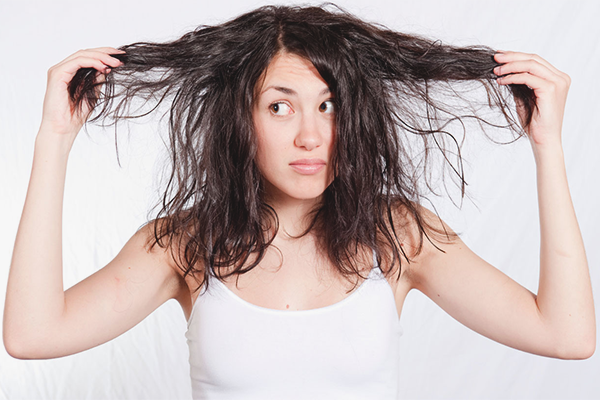
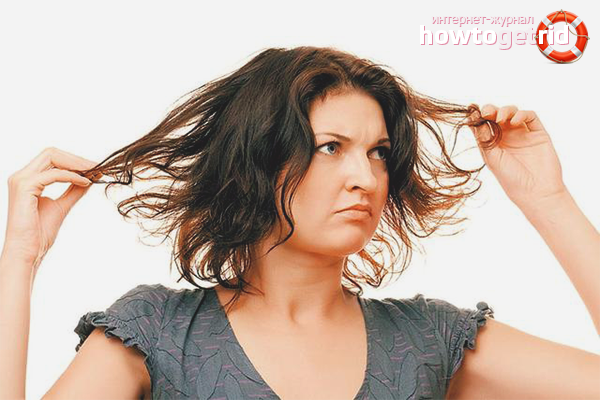
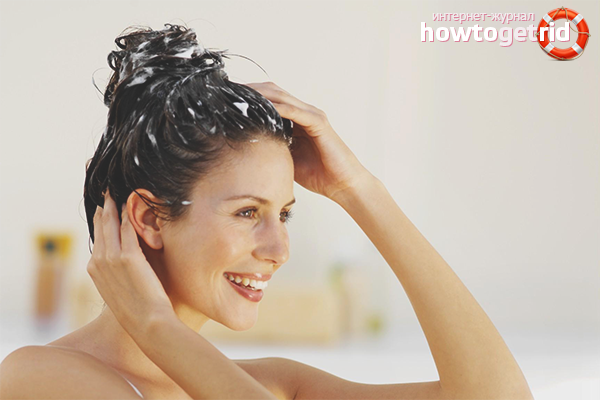


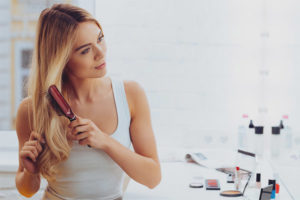
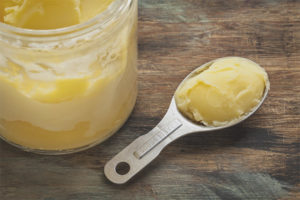
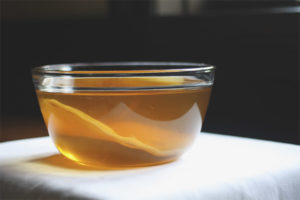
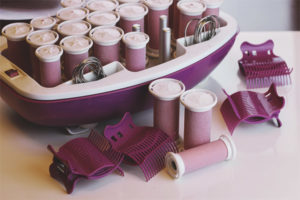
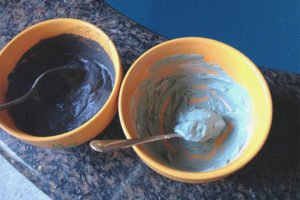
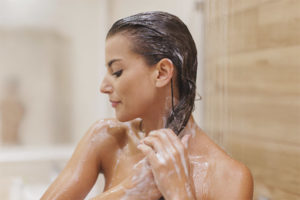
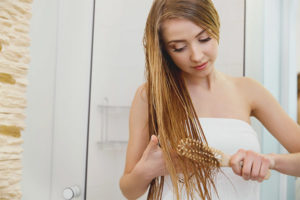
To send